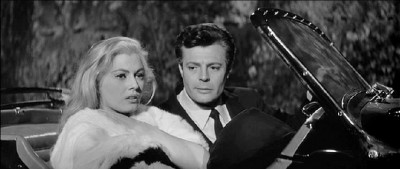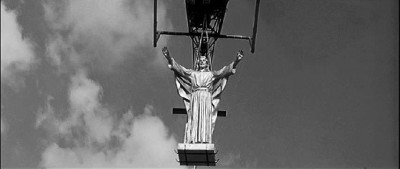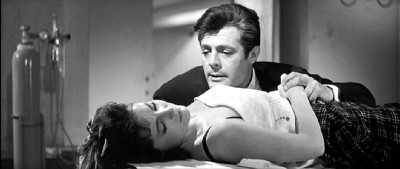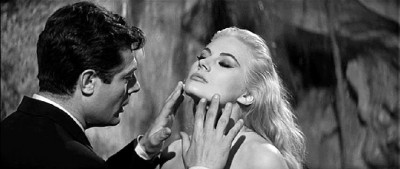
Seeing Fellini’s La Dolce Vita (1960) for the first time since seeing Paolo Sorrentino’s BAFTA-winning, Oscar-nominated The Great Beauty is an interesting experience to say the least. Not to sell The Great Beauty short—I think it’s wonderful and hope it wins the Oscar—but it’s a film that could not exist without La Dolce Vita. The two films complement each other as few films have. (In fact, they’d make a terrific, if nearly six hour long, double bill.) The Great Beauty (among other things) is a modern day La Dolce Vita. Its main character is virtually the 65-year-old version of Marcello Mastroianni’s character in La Dolce Vita.

But what is most startling about seeing the two films close together is how the world’s vapid pleasures and vague longings haven’t changed much in over 50 years. Oh, the characters dress better in La Dolce Vita, they drive cooler cars (of course, they were contemporary cars in 1960), and, in the case of the lead, there’s the hopefulness (and cynical veneer) of youth. But overall, not much has changed. The two worlds are merely extensions of each other. A naked performance “artist” bashing her head against a stone wall in The Great Beauty seems no more absurd than the rock ‘n’ rollers in La Dolce Vita—only perhaps more extreme.

Here is what I wrote in 2006 (with some additions): Straddling the line between Fellini’s realistic early period and the full-grown fantastication that began with 8 1/2 (1963) is La Dolce Vita (1960). It shares elements of both eras of Fellini—being at once realistic and yet edging toward the fantastic, and even incorporating elements of the fantastic into its reality. (There is even a direct hint of 8 1/2 in the gesture of Marcello Mastroianni peering over his glasses.) The film begins with the image of a huge statue of Christ flying through the air—suspended beneath a helicopter. This is the modern world, after all. But, in the structure of the film—which ends with the discovery of a prehistoric “sea monster” in a fisherman’s net (a further Christ reference) and the inaudible words of a girl—the modern world is a snare and an illusion, one where human communication has all but broken down.

These events frame—and involve—the character of Marcello (Marcello Mastroianni), who lives what he thinks is “the sweet life” (la dolce vita) as he pursues his career as a seedy journalist and his avocation as a would-be playboy. Yet within Marcello is the desire to be something more, do something more. He wants to be a great writer, but the distractions are too great (and his shallowness is perhaps the most real thing about him), and he’s pinned his hopes on an intellectual hero (Alain Cuny), who turns out to be much less than he seems in the course of the film. La Dolce Vita is a film about self-delusion and the emptiness of modern life—as well as the allure of that life with its faux glamour and easy exhibitionism—not to mention the flash of the paparazzi or the endless stream of women. Richly detailed, provocative and more than a little disconcerting, it represents a major filmmaker on the verge of his complete power.
Classic World Cinema by Courtyard Gallery will presentLa Dolce VitaFriday, Feb. 21, at 8 p.m. at Phil Mechanic Studios, 109 Roberts St., River Arts District (upstairs in the Railroad Library). Info: 273-3332, www.ashevillecourtyard.com



Before you comment
The comments section is here to provide a platform for civil dialogue on the issues we face together as a local community. Xpress is committed to offering this platform for all voices, but when the tone of the discussion gets nasty or strays off topic, we believe many people choose not to participate. Xpress editors are determined to moderate comments to ensure a constructive interchange is maintained. All comments judged not to be in keeping with the spirit of civil discourse will be removed and repeat violators will be banned. See here for our terms of service. Thank you for being part of this effort to promote respectful discussion.